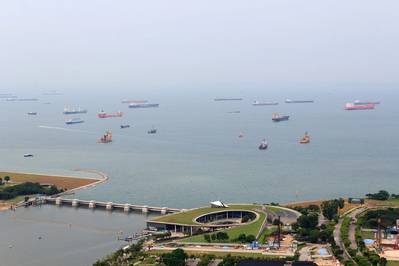Autonomy Will Advance Maritime Decarbonization
Technologies are mature and ready to support maritime work towards 2050 net-zero goals but regulations around systems development require further work.
The complex decarbonized systems of the future will require autonomous management systems for viable exploitation. These were among some of the key insights shared with delegates at a one-day Automation Summit, part of Singapore Maritime Week, led by The National Physical Laboratory (NPL) and Lloyd’s Register.
Potential efficiency gains in bunkering of alternative fuels through autonomous berthing and transfer systems were highlighted by the Maritime Port Authority of Singapore (MPA) as an example of how autonomous systems will contribute to net-zero emissions and, autonomous ship technology company, HHI Avikus indicated that a 15% fuel reduction during transit is achievable using autonomous navigation.
As autonomous technology moves beyond demonstration stage and undertakes the transition to operationalization, speakers flagged concerns about systems-level maturity lagging due to a lack of regulations and requirements guiding its progression.
Addressing this challenge calls for a robust verification and validation process, underpinned by science and quantification, to demonstrate to regulators the value of traceable completeness of evidenced safety and consistency of performance, delegates were told. Those in the room who commented agreed that the realization of safety and environmental benefits from autonomy will come when the commercial case is proven.
The summit followed an agreement in 2023 between UK and Singapore research agencies to collaborate on research into Maritime Autonomous Surface Ships (MASS) and remotely operated vessels and focused on the development of pro-innovation standards and test methodologies to enable the deployment of MASS.
Discussions and collaboration during the summit stem from the UK-based Maritime Autonomy Assurance Testbed (MAAT) partnership led by NPL and Lloyd’s Register. This has focussed on building a test and certification programme to provide a pathway to safe adoption of these technologies.
The summit also identified priority areas of research on this topic, including the development of common taxonomies, test standards and methods for validating virtual test environments, and the coalitions of organisations and countries required to deliver these.
Andre Burgess, Assured Autonomy Lead for the Partnerships Group at NPL, said, “Autonomy presents unique opportunities and challenges at the same time. As evidenced throughout the Summit, the Maritime Autonomy space is an excellent opportunity to demonstrate and deliver international agreement on science led standards for testing and assurance, which in turn will ensure the benefits of this emerging technology can be fully realised.”
Tony Boylen, Maritime Innovation Leader at Lloyd’s Register, said, “The summit identified the important next steps so that autonomy can be integrated into maritime operations and the environmental and safety advantages realized. Collaboration across nations, regulators and industry stakeholders, which was evident at the summit, provides the opportunity to deliver expedited and rounded autonomy to the sector and demonstrate the commonalities of our global aspirations.”














